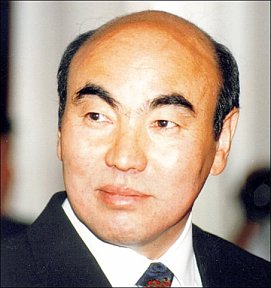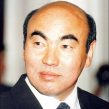
MASS PROTESTS, LITTLE CHANGE AFTER KYRGYZ PARLIAMENTARY RUNOFF
Publication: Eurasia Daily Monitor Volume: 2 Issue: 51
By:

Voters in Kyrgyzstan returned to the polls on March 13 for a second round of voting for a new parliament. The results confirmed majority representation for pro-presidential forces in the next single-chamber parliament. With six months to go before the presidential election, the mass protests throughout the country have only begun to build momentum.
Candidates from 40 of the total 75 electoral districts who did not win a majority in the first round on February 27 had to return for a runoff. Among the more notable candidates were Bermet Akayeva, President Askar Akayev’s daughter and informal leader of the pro-governmental Alga Kyrgyzstan party, and well-known representatives from the opposition, such as Adakham Madumarov and Omurbek Tekebayev. According to the early returns from the Central Election Commission, Akayeva received 42% of votes, while her opponent, Bolotbek Maripov, received only 13%, a few percentage points lower than in the first round. Akayev’s son, Aidar Akayev, secured his seat in the first round and did not stand on March 13.
The coalition “For Democracy and Civil Society” reported a number of violations at the University and Uzgen districts, which were committed by competing candidates and Central Electoral Commission members. In particular, people were transported to polling stations in groups, making it nearly impossible for independent observers to inspect documents. Turnout was a reported 51%, lower than in the first round (Kyrgyzinfo.kg, March 14).
The controversial election generated a series of unprecedented statements from the opposition forces and mass protests that began in early March continued until the runoff. Contrary to expectations, protests began in remote areas far from the capital, Bishkek, and were concentrated mainly in the southern region of the country. The number of protestors ranged from a few dozen to 2,000 people in Naryn and the densely populated southern cities of Jalalabad, Osh, and Uzgen. The protesters’ demands included canceling the results of the allegedly fraudulent elections and Akayev’s early resignation.
The People’s Movement of Kyrgyzstan coordinated the protests. Created in the months leading up to the elections, the movement includes many of the opposition’s most prominent figures: Bektur Asanaliyev, Kurmanbek Bakiyev, Dooronbek Sadyrbayev, Usen Sydykov, and Topchubek Turgunaliyev. The PMK includes the Ata-Jurt movement, the “For Fair Elections” bloc, Jany Bagyt, the National Movement of Kyrgyzstan, and the National Congress of Kyrgyzstan.
People’s Movement leader Kurmanbek Bakiyev has demanded early presidential elections and an extension of the current parliament’s mandate. This suggestion was followed by a March 10 gathering of 23 parliamentarians outside the parliament building in Bishkek who passed a vote of no confidence in the president and the Central Election Commission.
Law-enforcement agencies forcefully suppressed civilian demonstrators during the protests in Naryn. One woman was reported injured on March 10. The next day, as a response to the government’s use of violence, protestors from Naryn began to march toward Bishkek until militia detained their leader, Tursunbai Akun, on March 13. On March 3 a bomb detonated in the Bishkek apartment of opposition leader Roza Otunbayeva; no one was injured or killed. The government denied any responsibility for the incident, claiming that opposition forces intentionally set off the bomb as an attempt to attract the attention of the international community.
For the first time, several newspapers in Kyrgyzstan were suppressed simultaneously and state-financed mass media dominated election coverage. The only independent radio station broadcasting throughout the country, Azattyk, was closed on February 24. Two opposition news websites with servers located in Kyrgyzstan, Moya stolitsa novosti (msn.kg) and Res publica (respublica.kg) suffered from massive hacker attacks that temporarily shut down access. According to the Open Net Initiative (ONI, March 5), a hacker group named “Shadow Team” deluged pro-opposition websites located outside Kyrgyzstan with spam.
So far, the protests have not damaged Bishkek’s interests abroad. On March 11 the Paris Club of creditors decided to write off about $555 million of Kyrgyzstan’s external debt, and 431 million Euros will be restructured in line with the IMF’s poverty reduction and economic development program (Akipress, March 11). Kyrgyz-Russian military relations also received a boost as the Russian Ministry of Defense announced its intention to increase funding of the Russian air defense base in Kant by one billion rubles in 2005.
The parliamentary elections in Kyrgyzstan received more international attention than did similar votes in neighboring Kazakhstan and Uzbekistan. The American ambassador in Bishkek, Steven Young, publicly expressed concerns about numerous violations of the election law in the first stage of elections and the two-week gap before the runoff.
The next parliament to be seated in Kyrgyzstan will consist of 75 seats and be dominated by pro-governmental politicians, including two of the president’s children and members of the pro-government Alga Kyrgyzstan party. It is too early to tell if mass protests will continue in the country and if they will lead to any meaningful changes before the presidential elections in October. The time between the two rounds of voting showed the potential of the masses to challenge the government in a peaceful way. But at the same time, the Kyrgyz government responded with a number of undemocratic means to suppress the freedom of speech and prevent unwanted demonstrations.




